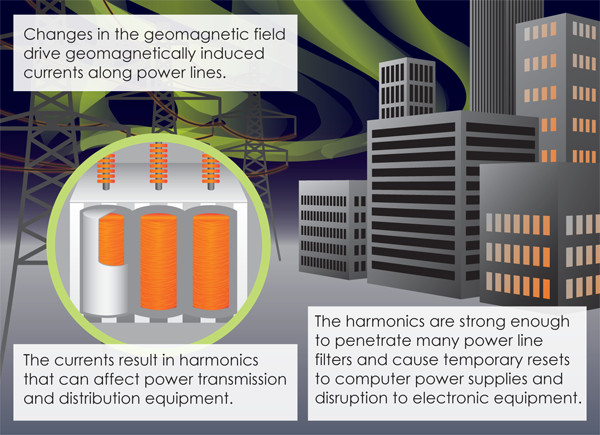
by Mary Caperton Morton Thursday, October 2, 2014

A new study suggests that solar storms correlate with upticks in business insurance claims for complications such as electrical surges, arcing and overheating. Credit: Kathleen Cantner, AGI.
On March 13, 1989, a geomagnetic storm spawned by a solar outburst struck Earth, triggering instabilities in the electric power grid that serves much of eastern Canada and the U.S. The storm led to blackouts for more than 6 million customers and caused tens of millions of dollars in damages and economic losses. More than 25 years later, the possibility of such a catastrophe still looms, and the day-to-day effects of space weather on electrical systems remain difficult to quantify. Now, a new study correlating electrical insurance claims with geomagnetic data suggests that even moderate space weather may play a significant role in destabilizing the power grid.
“We hear a lot about worst-case scenarios where a coronal mass ejection might take down the whole power grid, but that happens so infrequently that it’s not easily studied,” says Carolus Schrijver, a heliophysicist at the Lockheed Martin Solar and Astrophysics Laboratory in California and lead author of the new study, published in the Space Weather Journal. “So we lowered the threshold to see if we could find signatures of the impact of space weather on the electric power grid by looking at lesser storms.”
Schrijver and colleagues turned to a decade’s worth of insurance claim records kept by the Zurich North America insurance group for damages and outages of electrical and electronic systems submitted by a variety of industries all over the U.S. “Of course the insurance company was very concerned about protecting their customers’ privacy, but all we needed to know was roughly where it happened, by state, and the date on which it happened,” he says.
By focusing on claims submitted between 2000 and 2010, the research covered the standard 11-year cycle associated with solar magnetic activity. After weeding out the claims that were unlikely to be related to geomagnetic weather, such as those due to water damage, the team performed a statistical analysis against geomagnetic data collected by the U.S. Geological Survey, which tracks interactions between Earth’s magnetic field and magnetic storms from the sun on a daily basis at 30-minute intervals.
The correlation was “really quite striking,” Schrijver says. The team found that claims rates were higher on days with elevated geomagnetic activity, with claims increasing by as much as 20 percent on days with high geomagnetic activity.
“I’m not at all surprised by their findings, as we’ve seen plenty of anecdotal evidence that even minor storms can impact customer systems,” says John Kappenman, an electrical engineer with Storm Analysis Consultants, based in Duluth, Minn., who was not involved in the new study. “As far as I know, this is the first time somebody has used insurance claim data to study these impacts, and their findings really highlight how serious this problem is,” he says.
So far, Schrijver’s team has only looked at records from one insurance company, which deals with roughly 8 percent of the market share in North America. In their study, Schrijver and co-authors extrapolated from their dataset to estimate a potential total impact of billions of dollars to the U.S. economy. In a typical year, losses due to power outages — from all causes — are about $188 billion. “The economic impact of power-quality variations related to elevated geomagnetic activity may be a few percent of the total impact, or several billion dollars annually,” Schrijver and his colleagues wrote. “That very rough estimate obviously needs a rigorous follow-up assessment, but its magnitude suggests that such a detailed, multidisciplinary study is well worth doing.”
The next step will be to perform broader analysis with larger datasets from more insurance companies. “This was really just a pilot study,” Schrijver says. “Our primary goal was simply to demonstrate that there is an impact and that it’s significant enough that more people should be studying it.”
Disturbances to the power grid don’t usually make the headlines in the way that other natural disasters do, Kappenman says, but the potential impacts should not be underestimated. “Earthquakes and hurricanes can be devastating, but they generally only affect one region. The power grid is a continentwide problem,” he says. “It’s important to recognize that this is a huge vulnerability that needs a lot more study.”
© 2008-2021. All rights reserved. Any copying, redistribution or retransmission of any of the contents of this service without the expressed written permission of the American Geosciences Institute is expressly prohibited. Click here for all copyright requests.